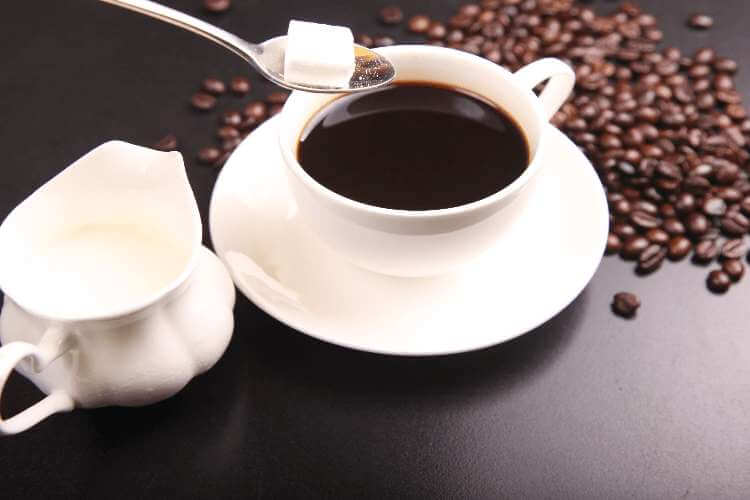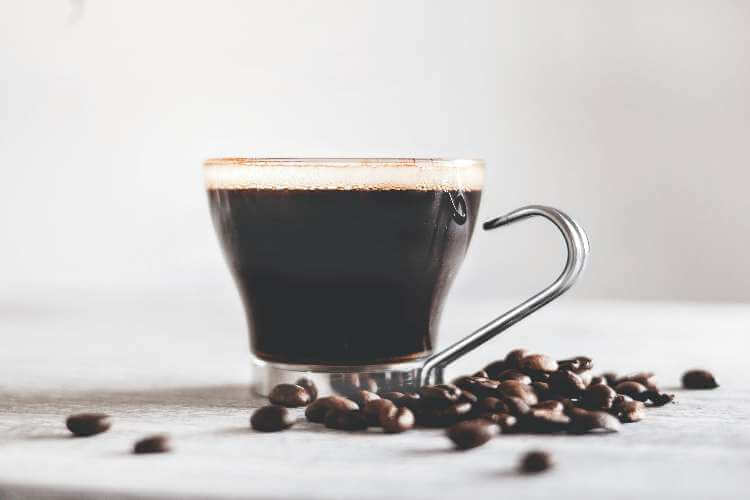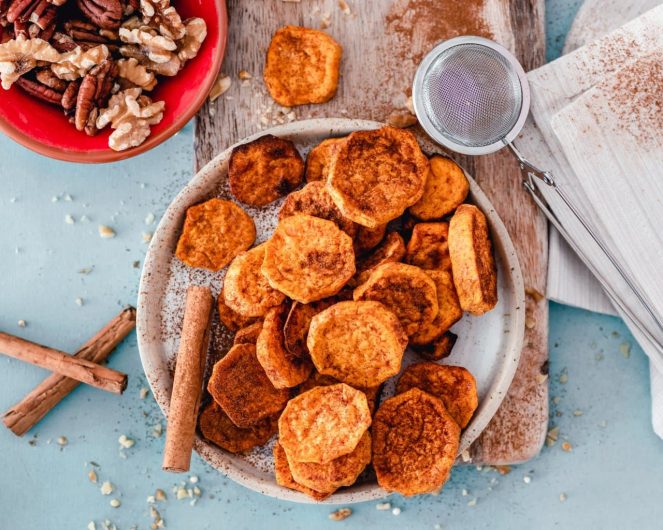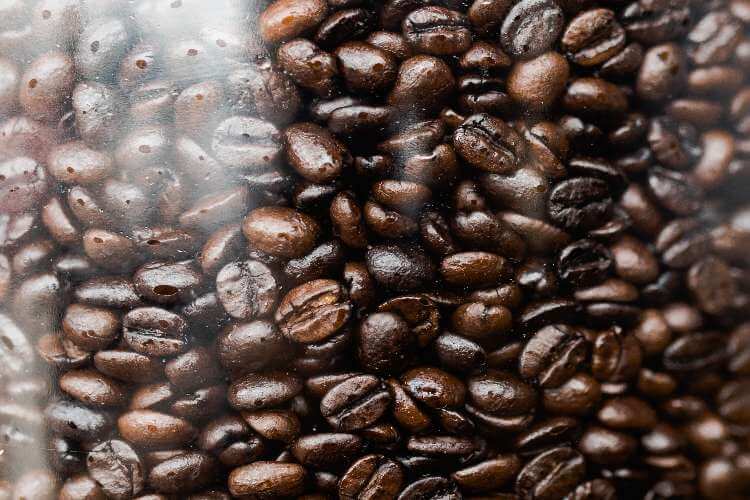
It’s no secret that coffee is one of the most popular drinks in the world. And for a good reason! Not only does it taste great, but it also contains caffeine, which can help wake you up in the morning or give you a much-needed energy boost during the day. But how much caffeine does black coffee actually have? While caffeine can vary depending on several factors, a cup of black coffee typically has around 95mg. This post will explore how much caffeine is in black coffee and how it can affect your health. We will also look at tips on reducing the amount of caffeine in your coffee if you are sensitive to it.

Drinking coffee is an essential part of most people’s lives. Coffee tastes great and provides a nice kick to a lazy morning. My day is only complete if I’ve had my morning cup of joe. Whether you need a slight lift in the pants or an extra push on those days when you’re feeling a little under the weather, black coffee keeps you awake (or at least gives you the illusion that you are!).
So, how much caffeine is in black coffee? The answer may surprise you. A typical cup of black coffee has about 95 milligrams of caffeine.
I. Introduction
Caffeine is a stimulant that occurs naturally in coffee beans. When coffee is brewed, the caffeine is extracted from the beans and dissolved in the water. The caffeine content of a cup of coffee is determined by several factors, including the type of bean, the grind, the brewing method, and the amount of water used.
The average cup of black coffee has 95-200 mg of caffeine. However, there can be significant variations in the caffeine content of different brands and types of black coffee. For example, instant coffee typically has less caffeine than drip-brewed coffee. And decaffeinated coffee still contains small amounts of caffeine.
If you’re sensitive to caffeine or are trying to limit your intake, it’s essential to know how much caffeine is in your cup of coffee. You can ask your barista for more information about the caffeine content of specific coffees or check the nutrition facts label if you’re buying packaged coffee.
Assuming you want a detailed answer to the question in the title:
How Much Caffeine Does Black Coffee Have?
A cup of black coffee contains around 95 mg of caffeine, while a decaf coffee has about 2 mg of caffeine.
What is caffeine?
Caffeine is a stimulant that occurs naturally in coffee beans. When coffee is brewed, the caffeine is extracted from the beans and dissolves in the water. Black coffee includes all of the dissolved caffeine from the beans but no other ingredients, making it a pure source of caffeine.
The average cup of black coffee contains 95-200 milligrams of caffeine. However, this can vary depending on the type of bean, roast, grind, brewing method, and cup size. For example, a Shot of espresso has about 64 milligrams of caffeine, while a 12-ounce serving of brewed coffee has about 120 milligrams.
Caffeine stimulates the central nervous system (CNS), heart, and muscles. This boost in activity can lead to improved alertness and focus. Caffeine also causes an increase in blood pressure and heart rate. However, these effects are usually temporary and go away once the caffeine wears off.
Too much caffeine can cause side effects like jitters, anxiety, irritability, trouble sleeping, and an accelerated heart rate. It’s essential to be aware of your own tolerance for caffeine and limit your intake accordingly.
Caffeine is a stimulant that occurs naturally in over 60 plants, including coffee beans. It’s the world’s most widely consumed psychoactive substance and can positively and negatively affect your health. Caffeine can improve mental alertness, memory, and physical performance when consumed in moderation. However, too much caffeine can lead to restlessness, anxiety, irregular heartbeat, and difficulty sleeping.
Caffeine works by binding to adenosine receptors in the brain. Adenosine is a neurotransmitter that makes you feel tired by slowing down nerve cell activity. When caffeine binds to these receptors, it prevents adenosine from doing its job, resulting in increased alertness. Caffeine also causes the release of dopamine and norepinephrine, two other neurotransmitters that further enhance attention and focus.
There are many types of caffeinated products.
Caffeinated products come in many forms, from coffee and tea to energy drinks and sodas. The amount of caffeine in each product varies, so it’s essential to know how much caffeine you’re consuming.
A cup of black coffee typically contains around 95 mg of caffeine, while a cup of green tea has about 35 mg. An energy drink can have anywhere from 50-250 mg of caffeine, while a soda usually has around 35 mg.
If you’re trying to reduce your caffeine intake, it’s essential to know how much caffeine is in your consuming products. Remember that caffeine can vary depending on the product type and the serving size, so check the label before consuming anything.
Many caffeinated products include coffee, tea, energy drinks, and soda. Black coffee typically contains more caffeine than other types of coffee, such as decaf or flavored. The amount of caffeine in black coffee can vary depending on the type of bean used, the brewing method, and the size of the cup. A typical 8-ounce black coffee has 95-200 milligrams of caffeine.
Caffeine enhances performance in groups and everyday work.
Caffeine promotes alertness and wakefulness, improving performance in work environments where people must be alert and attentive. For example, one study found that office workers who drank caffeinated coffee were more productive than those who didn’t drink any coffee at all.
In addition, caffeine can also help people perform better in group settings. One study found that students who consumed caffeine before a group discussion were likelier to speak up and contribute to the debate than those who didn’t drink caffeine.
So, if you’re looking for a way to boost your performance at work or in group settings, try drinking some black coffee. Just be sure not to overdo it – too much caffeine can lead to side effects like anxiety and restlessness.
Caffeine is a central nervous system stimulant that has been shown to improve attention, reaction time, and task performance. Caffeine has also been shown to improve work performance in groups. Several studies have found that caffeine enhances performance, especially on tasks requiring vigilance and extended periods of mental focus. For example, one study found that caffeine improved accuracy on a sustained-attention job by 14%.
In addition to its effects on task performance, caffeine has also been shown to enhance social interactions and reduce feelings of fatigue. One study found that after taking caffeine, people were more likely to approach and interact with others and reported feeling less tired. These effects are possible because caffeine increases dopamine levels in the brain, leading to increased motivation and energy.
Providing essential benefits like a reduced risk of Parkinson’s disease, dementia, and some cancers
Caffeine is a naturally occurring compound found in coffee beans. When coffee beans are roasted, the caffeine is more concentrated and can have different effects on the body depending on how it is consumed. Black coffee has the highest caffeine concentration compared to other coffee types, like espresso or cappuccino.
Studies have shown that drinking black coffee can provide essential benefits like a reduced risk of Parkinson’s disease, dementia, and some cancers. The caffeic acid in black coffee helps protect the brain from damage and degeneration. Caffeine also increases alertness and cognitive function.
So how much caffeine does black coffee have? A cup of black coffee typically contains 95-200 milligrams of caffeine. However, the amount of caffeine in black coffee can vary depending on factors like the type of bean used, roast level, grind size, and brewing method.
If you’re looking for an energy boost or want to improve your cognitive function, drink up! But be sure to enjoy black coffee in moderation, as too much caffeine can lead to side effects like anxiety, irritability, and difficulty sleeping.
Caffeine has been shown to provide essential benefits like a reduced risk of Parkinson’s disease, dementia, and some cancers. The University of Manchester’s School of Biological Sciences found that coffee protects against cancer by killing damaged cells. Scientists believe that the antioxidants in coffee are responsible for this cell-destroying effect. A study published in the journal Nature Medicine showed that caffeine can also help to prevent the onset of Alzheimer’s disease and other forms of dementia. Researchers found that caffeine blocks a brain enzyme called adenosine, which is thought to play a role in developing these conditions. Caffeine may also help to protect against Parkinson’s disease. A study published in the journal Annals of Neurology found that people who consume more caffeine have a lower risk of developing the condition.
II. Black coffee facts
There are a few key things to remember regarding the caffeine content in black coffee.
– First, A typical 8-ounce cup of black coffee has 95 mg of caffeine
-Different beans can make black coffee, each containing caffeine. For example, Robusta beans have twice as much caffeine as Arabica beans
-The amount of caffeine in black coffee can vary depending on how it’s brewed. For instance, espresso generally has more caffeine than drip coffee.
Three big myths regarding coffee and caffeine
Coffee is one of the most popular beverages in the world, and caffeine is a big part of why. But there are a lot of misconceptions out there about coffee and caffeine. Let’s debunk some myths!
Myth #1: Coffee Has More Caffeine Than Other caffeinated drinks
In fact, coffee has less caffeine than many other popular caffeinated beverages. A typical 8-oz cup of coffee has about 95 mg of caffeine, while a 12-oz can of soda has about 35 mg and a 16-oz energy drink has about 160 mg. So coffee is not the best choice if you want a significant caffeine boost.
Myth #2: Dark Roast Coffee Has More Caffeine Than Light Roast
Actually, it’s the opposite! Dark roast coffee beans have been cooked more extended, which breaks down the caffeine molecules and results in a cup of coffee with less caffeine. Dark roast is the way to go if you’re trying to reduce caffeine intake.
Myth #3: decaf Coffee Has No Caffeine At All
While it’s true that decaf coffee has less caffeine than regular coffee, it still contains some caffeine. A typical 8-oz cup of decaf coffee has about 2 mg of caffeine, while an 8-oz cup of regular coffee has about 95 mg. So if you’re trying to avoid all traces of caffeine, decaf might not be the
iii) Study done by Marilyn Cornelis et al. found that kids who drank four cups or more of coffee each day had 8% less protein intake
A study by Marilyn Cornelis et al. found that kids who drank four cups or more of coffee each day had 8% less protein intake. The study also found that these kids had lower intakes of calcium, phosphorus, magnesium, iron, copper, manganese, selenium, potassium, and sodium.
What is caffeine?
Caffeine is a naturally occurring stimulant found in coffee beans. Caffeine is released when coffee beans are roasted and can be extracted from the beans using hot water. Black coffee is made by brewing coffee grounds in hot water without adding additional flavorings or sweeteners. This results in a drink that contains a high concentration of caffeine.
How much caffeine is in black coffee?
A typical 8-ounce cup of black coffee contains 95 mg of caffeine. However, the amount of caffeine in coffee can vary greatly depending on the type of bean, the roasting method, and how long the coffee is brewed. For example, an espresso with Arabica beans has about half the caffeine as a regular coffee brewed with Arabica beans.

How does caffeine affect the body?
Caffeine is a stimulant that affects the central nervous system. It can make you feel more awake and give you a boost of energy. Caffeine can also help improve your physical performance and mental alertness.
However, too much caffeine can cause side effects like anxiety, jitters, and heart palpitations. And if you’re not used to it, caffeine can make you feel nauseous.
Caffeine is also addictive and can lead to withdrawal symptoms if you suddenly stop using it. So it’s essential to know how much caffeine you’re consuming and how it might affect your body.
Should you drink black coffee if you’re trying to cut down on caffeine?
When it comes to caffeine, black coffee has more than other types of coffee. You may want to avoid black coffee if you’re trying to reduce caffeine. However, everyone’s tolerance for caffeine is different. If you can drink black coffee without experiencing any adverse effects, then there’s no need to avoid it.
Are there any benefits to drinking black coffee?
Yes, there are a few benefits to drinking black coffee. For one, black coffee is a good source of antioxidants. Antioxidants help to protect the body against damage from free radicals, which can lead to disease. Additionally, black coffee can help to improve cognitive function and vigilance. Finally, drinking black coffee regularly has been linked with lower death rates from all causes, including heart disease and cancer.
Conclusion
We hope this article has helped to clarify any confusion about how much caffeine is in black coffee. Remember, the amount of caffeine can vary depending on the type of coffee bean and the brewing method, so it’s always best to check with your barista or read the labels before you order. If you’re sensitive to caffeine or are trying to reduce your intake, opt for decaf or choose another beverage altogether.



